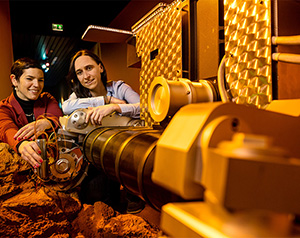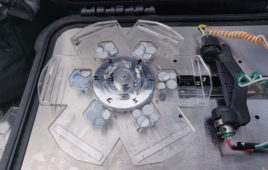 Women are still vastly outnumbered in engineering professions. Why is that? And what can be done about it? Two female maxon engineers talk about their experience and share some advice.
Women are still vastly outnumbered in engineering professions. Why is that? And what can be done about it? Two female maxon engineers talk about their experience and share some advice.
Petra Bründler (development engineer) and Lynn Braunschweig (technical project management) work in different units at the maxon motor headquarters in Switzerland. Their jobs are in no way connected. Yet there is something they have in common: They are both women working in a male dominated field.
How did you come to choose a technical profession?
Petra: I’ve always liked science, math, and logic. In my vocational training in electronics, I enjoyed the mix of classroom education and work at the company, and between mental and physical tasks.
Lynn: My mother is an emancipated, strong woman, a math teacher and good at making and fixing things. When I was little, I always wanted to be like her. It was she who introduced me to the world of technology. Later, I had to choose between becoming a lawyer or an engineer, and I decided to study mechanical engineering.
What fascinates you about your current jobs?
Lynn: I’m a project manager in the aerospace division and currently in charge of brushless flat motors that are used on Mars. Of course I wanted to become an astronaut when I was little, like so many children. Yet even though I’m not flying into space myself, at least my motors do.
Petra: As a developer of embedded software, I like to completely immerse myself into this abstract world of classes and objects. It makes me forget everything around me. But I also like the teamwork. We find the best solutions when we put different approaches and ideas together.
Lynn: For us, teamwork is also key. Every day I am dealing with a wide range of technical disciplines and processes and have to adjust to new situations. It’s important to keep the big picture in mind while at the same time considering the details in the technical departments. Every day is different, and I keep learning new things.
Petra: Another thing that I like: In my job, I get lots of puzzles to solve, and usually I am rewarded with quick feedback: The motor either turns or it doesn’t.
Women are still vastly outnumbered in engineering professions everywhere in the world. Does that affect you in any way in your everyday work?
Petra: As a woman in a technical profession, you stand out. People remember you. If any-thing, that’s usually an advantage. It makes it easier to start a conversation and make new contacts.
Lynn: A few times I felt that as a woman, I wasn’t taken as seriously as a male employee with similar experience and training. However, I didn’t experience that as a negative thing. Quite the contrary: It motivated me to work harder and prove myself. At maxon, the share of women is relatively high. But still, we could use some more female engineers and project managers, or generally more women in leadership positions.
Read more in the latest issue of „driven“.
Filed Under: maxon Driven





As a drafter and designer i have worked for several women engineers over the years.
My experience has been that they have had to work harder to get to the same place as there male
counter parts. And as a whole were more knowledgeable.
The same for scientific jobs. Germans are desperate to hire more women on science, but after getting them on staff they don’t offer these females the same respect and opportunities as for their male colleagues. My best female colleague left our university last year, and another one talked to me last week about switching from science to industry for exactly the same reason.